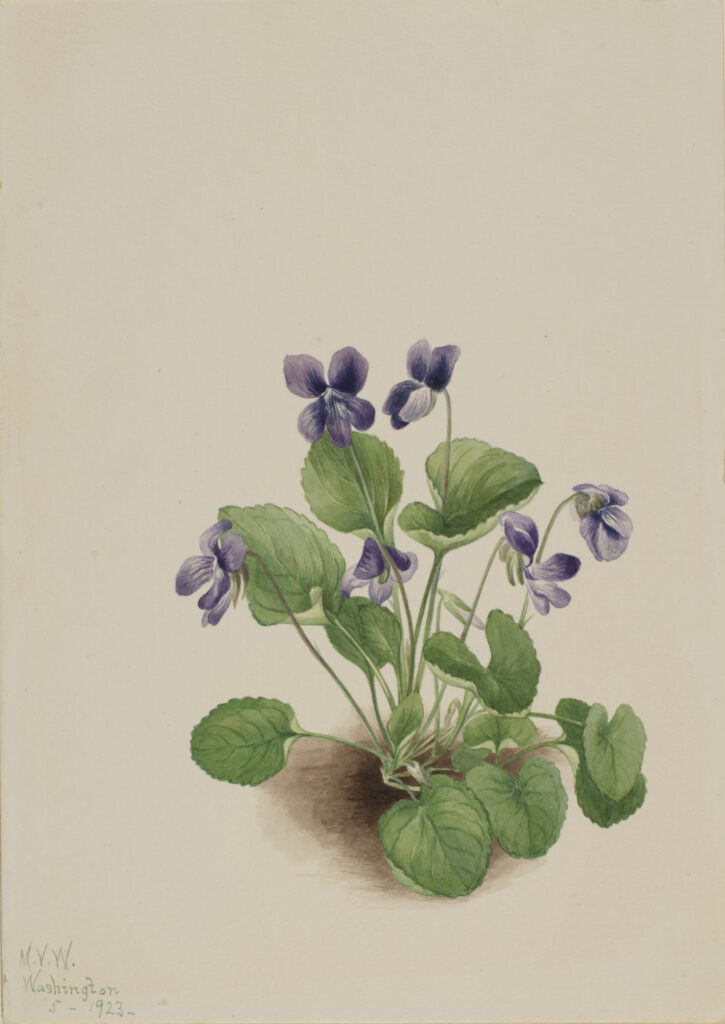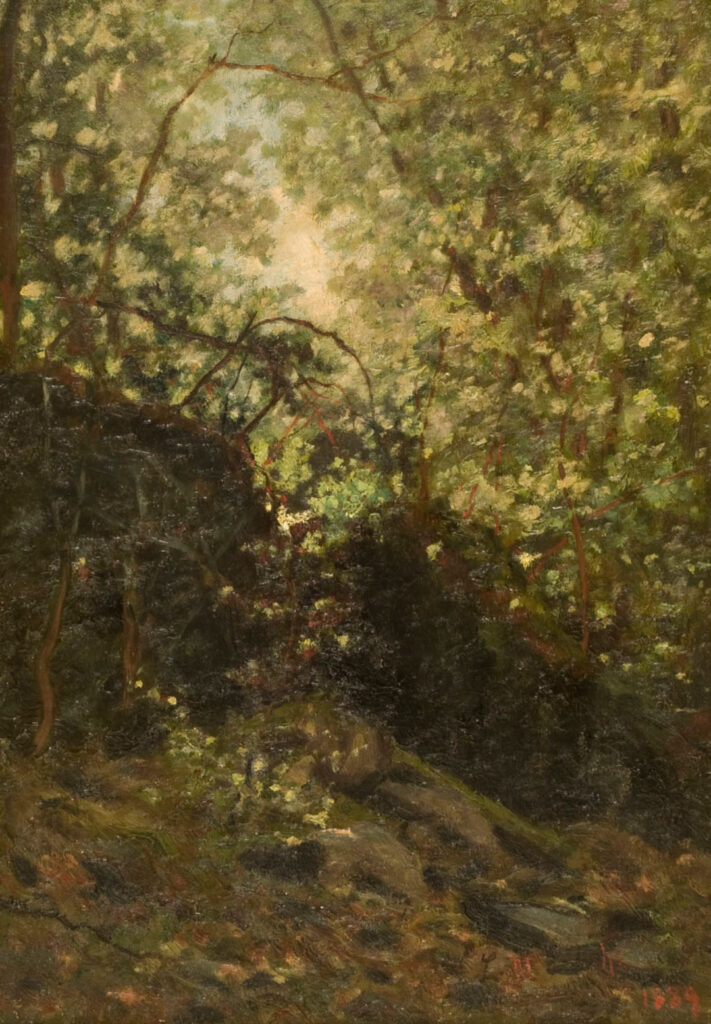A March Violet
By Emma Lazarus
Annotations by Maggie Kelly/JB

Black boughs against a pale clear sky, Slight mists of cloud-wreaths floating by: Soft sunlight, gray-blue smoky air, Wet thawing snows on hillsides bare; Loud streams, moist sodden earth; below Quick seedlings stir, rich juices flow Through frozen veins of rigid wood, And the whole forest bursts in bud. No longer stark the branches spread An iron network overhead. Albeit naked still of green; Through this soft, lustrous vapor seen On budding boughs a warm flush glows, With tints of purple and pale rose. Breathing of spring, the delicate air Lifts playfully the loosened hair To kiss the cool brow. Let us rest In this bright, sheltered nook, now blest With broad noon sunshine over all, Though here June’s leafiest shadows fall. Young grass sprouts here. Look up! the sky Is veiled by woven greenery. Fresh little folded leaves—the first, And goldener than green, they burst Their thick full buds and take the breeze. Here, when November stripped the trees. I came to wrestle with a grief: Solace I sought not, nor relief. I shed no tears, I craved no grace I fain would see Grief face to face, Fathom her awful eyes at length, Measure my strength against her strength, I wondered why the Preacher saith, “Like as the grass that withereth.” [1] The late, close blades still waved around; I clutched a handful from the ground. “He mocks us cruelly,” I said: “The frail herb lives, and she is dead.” I lay dumb, sightless, deaf as she; The long slow hours passed over me, I saw Grief face to face; I know The very form and traits of Woe. I drained the galled dregs of the draught She offered me: I could have laughed In irony of sheer despair, Although I could not weep. The air Thickened with twilight shadows dim: I rose and left. I knew each limb Of these great trees, each gnarled, rough root Piercing the clay, each cone of fruit They bear in autumn. What blooms here, Filling the honeyed atmosphere With faint, delicious fragrancies, Freighted with blessed memories? The earliest March violet, Dear as the image of Regret, And beautiful as Hope. Again Past visions thrill and haunt my brain. Through tears I see the nodding head, The purple and the green dispread. Here, where I nursed despair that morn, The promise of fresh joy is born Arrayed in sober colors still, But piercing the gray mould to fill With vague sweet influence the air, To lift the heart’s dead weight of care. Longings and golden dreams to bring With joyous phantasies of spring.

Lazarus, Emma. “A March Violet,” in The Cambridge book of poetry and song, ed. charlotte fiske bates, 337-38. Thomas Y. Crowell & Co., 1882.
Contexts
Emma Lazarus is best known for her sonnet “The New Colossus,” which is featured on the Statue of Liberty’s pedestal.
Definitions from Oxford English Dictionary:
draught: The drawing of liquid into the mouth or down the throat; an act of drinking, a drink; the quantity of drink swallowed at one “pull.” A dose of liquid medicine; a potion.
galled: (a) Affected with galls or painful swellings. (b) Sore from chafing. figurative. Irritated, vexed, unquiet, distressed.
Resources for Further Study
For more biographical information about Emma Lazarus and her legacy of activism, visit The Jewish Women’s Archive, Women of Valor and National Women’s History Museum. The Emma Lazarus Federation of Jewish Women’s Clubs grew out of the Jewish People’s Fraternal Order (JFPO), a division of the International Workers Order (IWO). The Cornell University Library has a digital collection of IWO and JFPO documents.
[1] This line likely refers to the Book of Yeshayahu (Isaiah) from the Hebrew Bible, or Tanakh, chapter 40, verses six through eight: “The voice said, Cry. And he said, What shall I cry? All flesh is grass, and all the goodliness thereof is as the flower of the field: The grass withereth, the flower fadeth: because the spirit of the LORD bloweth upon it: surely the people is grass. The grass withereth, the flower fadeth: but the word of our God shall stand for ever.”